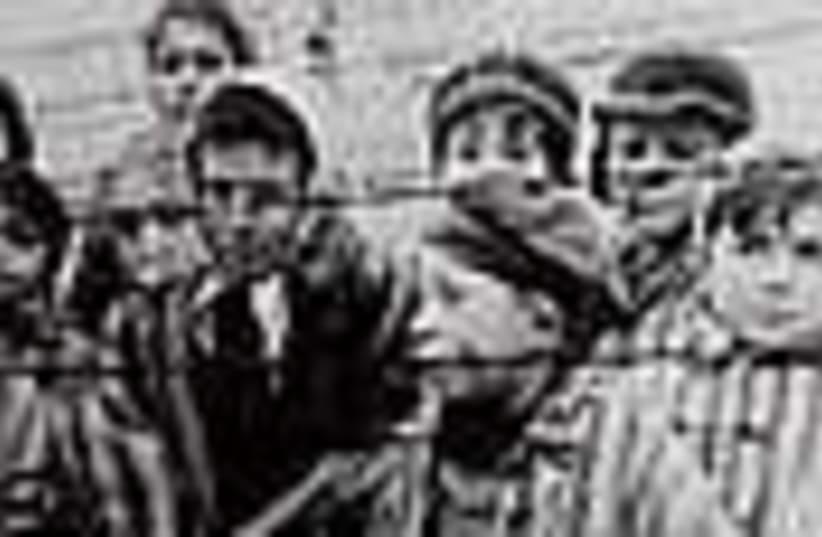No Berlin stop for Shoah train
Mobile Holocaust exhibit forced to skip stop to ensure German railway system run on time.
A vicious public spat between the head of the Düsseldorf Jewish community and the CEO of Deutsche Bahn, the German railway system, has exposed the extrodinary tensions that have plagued a Holocaust exhibition called the "Train of Commemoration."
On Thursday, the public prosecutor in Düsseldorf dismissed a criminal complaint lodged by Deutsche Bahn CEO Hartmut Mehdorn that charged the director of the city's 7,500-member Jewish community, Michael Szentei-Heise, with defamation and slander.
The complaint was originally filed after a non-Jewish grassroots-initiated Holocaust-remembrance project, the "Train of Commemoration," and German Jewish leaders criticized Mehdorn and the railway's management for impeding the remembrance project.
"The public sees you and your political structure such that, if you had been in the same position in the Third Reich as today, you would have directed the very same thing, perhaps with greater conviction, as your predecessor at the time," Szentei-Heise said in a speech early last month that prompted Mehdorn to initiate legal action against him.
The Train of Commemoration is meandering its way across Germany, showing photos and letters of Jewish, Roma and Sinti children who were deported by the Nazis to death camps during World War II. (Roma and Sinti are usually referred to as Gypsies.)
The display devotes space to the officials who worked for the Reichsbahn, the predecessor of the Deutsche Bahn, and participated in the mass murder of European Jewry.
According to Mehdorn's critics, the Deutsche Bahn has: refused to allow the mobile exhibit to stop at the bustling Hauptbahnhof train station in the heart of Berlin; charged exorbitant fees for the usage of tracks; and neglected the WWII roles of railway employees and officials.
There is "no word about those who committed the crimes," Hans-Rüdiger Minow, a spokesman for the Train of Commemoration, told The Jerusalem Post. He said 200,000 train employees were involved in the deportations and "10,000 to 20,000 were responsible for mass murders," but were never prosecuted.
Jens-Oliver Voss, a spokesman for the Deutsche Bahn, told the Post that since 2002, Deutsche Bahn has had a "permanent exhibition" in Nürnberg devoted to the "role of the German railway during National Socialism."
He said that in contrast to other firms such as automaker Mercedes-Benz and steel giant Thyssen Krupp, who "earned money" during the Nazi period, Deutsche Bahn had examined its company history in an exemplary way.
As for the criticism from the Train of Commemoration organizers, Deutsche Bahn was required by law to charge fees for the use of the tracks, and a stop at Berlin's largest station would have created "delays" and "hampered the entire transportation in Berlin," Voss said.
Speaking from Düsseldorf, Szentei-Heise, the Jewish community leader, said the "thought that Deutsche Bahn continued to earn" profits by charging fees was "disgusting."
In his March speech, which triggered national press coverage of the dispute with the Deutsche Bahn, Szentei-Heise said, "For me it looks as though those who are in authority today are sorry, in retrospect, to have sent little children to death for free, and want to compensate for this loss of money by charging a fee in connection with this train, which in fact memorializes those children. I can't see any other reason for this contemptuous cynicism."
Voss declined to comment on the dismissal of the criminal complaint against Szentei-Heise.
In response to the chorus of criticism, Deutsche Bahn offered to donate €100,000 to a Jewish organization. The general-secretary of the Central Council of Jews in Germany, Stephan Kramer, said, "That seems likes selling indulgences." He criticized Deutsche Bahn for using "anti-Semitic clichés" in its effort to silence critics.
Some argue that the train exhibit typifies a German obsession with the period between 1933 and 1945 at the expense of ignoring Iran's desire to destroy the Jewish state.
Henryk M. Broder, a leading cultural and political journalist, called the exhibit "superfluous," saying there was no shortage of memorials "paying attention to dead" Jews.
He argued the exhibit alleviates the "bad conscience" in Germany, but that no one is addressing President Mahmoud Ahmadinejad's threats that Iran will "wipe Israel off the map."
Szentei-Heise concurred with Broder's focus on Iran, saying he "can see the parallels" between the Holocaust and a possible second Holocaust launched by an Iranian nuclear attack on Israel.
He added that it was "very difficult to transmit" this message to the German public.
When asked about the Iranian threat to 6 million Israelis, Minow, from the Train of Commemoration, said, "We would make a huge mistake when we instrumentalize the dead" and use "these testimonials for Iran." This, he said, was "blasphemy."

